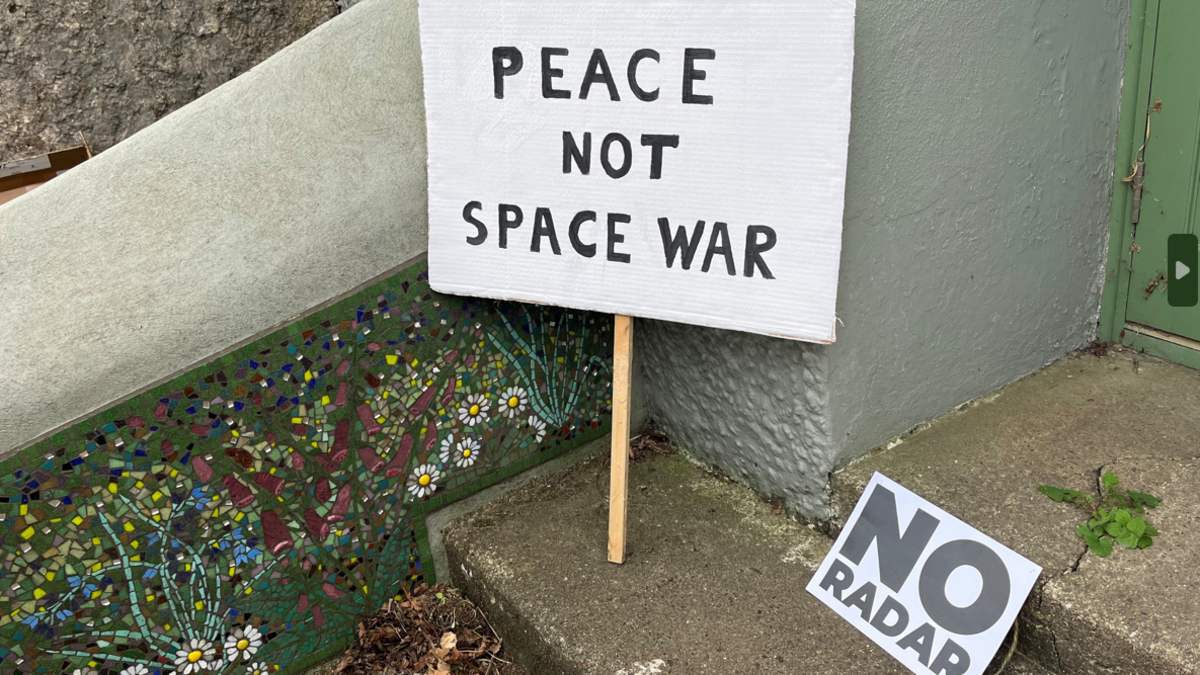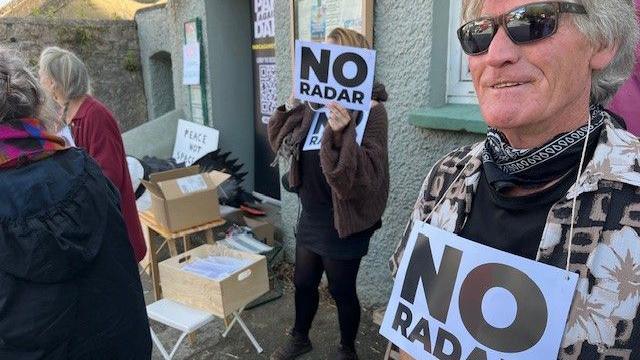Protest against space radar dishes plan

'Parc against Darc ' Campaigners camped overnight near the proposed site
- Published
Campaigners against plans to build space radar dishes in Pembrokeshire have held a peaceful protest outside a Ministry of Defence information day in Solva.
Many wore "No Radar" signs around their necks at Solva Memorial Hall as they quizzed MOD officials about the proposals.
More than 15,000 people have now signed an online petition opposing plans to build 27 radar dishes close to the Pembrokeshire Coast National Park.
The UK government said the Deep Space Advanced Radar Capability - known as DARC - is vital to track objects in deep space and protect satellite communication and navigation networks.
Campaigners protest against first UK space launch
- Published29 October 2022
Wales space office to bring investment, says head
- Published25 March 2024
It plans to build the radar installation at Cawdor Barracks, Brawdy, which is currently home to the 14 Signal Regiment.
Opponents of DARC fear it could pose a serious public health risk for the local population - a claim rejected by the MOD.
Campaigners set up a small camp overnight near the proposed site at Cawdor Barracks.
Penny Dafforn was one of those involved.
She said the aim was to raise awareness about local opposition, adding: "We would like the MOD to notice that we are not going to take this radar installation lying down and we are very against it and worried about it.
"So we thought if they had to drive past our protest camp, on the way to the meeting, they'd get the message."

More than 15,000 people have now signed an online petition opposing plans to build 27 radar dishes
In August, the Ministry of Defence , externalconfirmed it was pressing ahead with plans to build the DARC array in Pembrokeshire, with public information days taking place in both Solva and St David's.
Commodore David Moody from the UK Space Command, insisted the new installation will be safe as they will follow the World Health Organisation protocols.
He added: "The dish system has already been tested in New Mexico with the John Hopkins University, showing how the system will work, and there are no concerns from that facility."
DARC is a network of ground-based radars in the UK, the United States and Australia providing global space monitoring, and increasing the ability to detect, track and identify objects in deep space.
Defence Secretary John Healey claimed the new radar programme will "enhance our awareness of deep space" but also "help protect our space assets alongside our closest partners".

Jim Scott says there are unanswered questions about safety
Jim Scott, from the Parc against DARC Campaign said he remained unconvinced about the safety of the dishes.
"We have asked a series of very important questions in terms of safety and other important issues and they were unable to answer any of the questions we asked about the technical aspects of safety," he said.
"There were no definitive or useful answers."
Cawdor Barracks was set to close by 2028, but the redevelopment of the site for DARC will keep it open with 100 jobs being created to operate and maintain the radar.
Secretary of State for Wales Jo Stevens has said that the development will "secure jobs in the area" and is an "important project for Pembrokeshire."
Pembrokeshire council will ultimately decide whether the DARC radar installation is built at Brawdy.
The MOD said it is committed to undertaking "all necessary planning and environmental processes required to gain consent" and that a "comprehensive Environmental Impact Assessment, including a Landscape and Visual Impact Assessment, is underway".
It said DARC will have to meet international environmental and health standards set by the International Commission on Non-Ionizing Radiation Protection and the World Health Organisation.
A planning application is likely to be submitted in 2025, and building work could start late in 2026 if permission is granted by Pembrokeshire County Council.